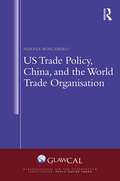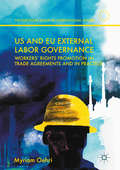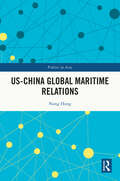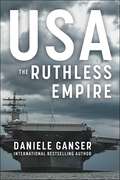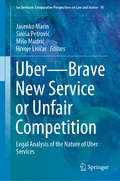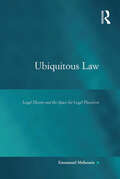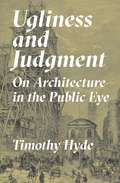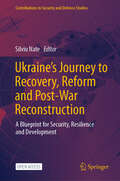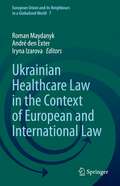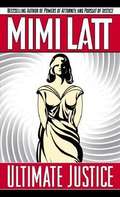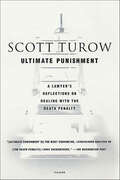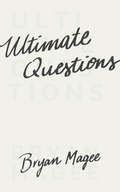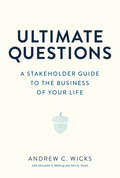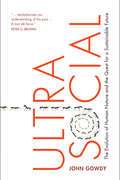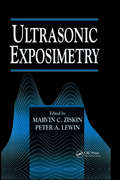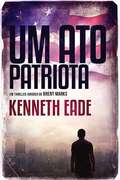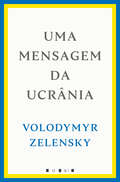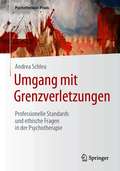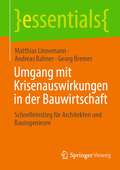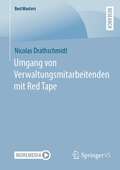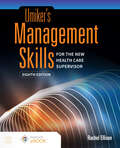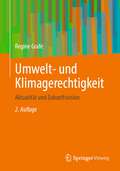- Table View
- List View
US Supreme Court Doctrine in the State High Courts
by Michael P. Fix Benjamin J. KassowUS Supreme Court Doctrine in the State High Courts challenges theoretical and empirical accounts about how state high courts use US Supreme Court doctrine and precedent. Michael Fix and Benjamin Kassow argue that theories that do not account for the full range of ways in which state high courts can act are, by definition, incomplete. Examining three important precedents – Atkins v. Virginia, Lemon v. Kurtzman, and DC v. Heller/McDonald v. Chicago – Fix and Kassow find that state high courts commonly ignore Supreme Court precedent for reasons of political ideology, path dependence, and fact patterns in cases that may be of varying similarity to those found in relevant US Supreme Court doctrine. This work, which provides an important addition to the scholarly literature on the impact of Supreme Court decisions, should be read by anyone interested in law and politics or traditional approaches to the study of legal decision-making.
US Trade Policy, China and the World Trade Organisation (Transnational Law and Governance)
by Nerina BoschieroThe last few years have been "anni horribiles" for in International Economic Law in general and in particular for the World Trade Organization, since its inception in 1995 the guarantor of the world multilateral trade system. The increasing trade tensions, a high level of US security tariffs on steel and aluminium, the US boycott of the WTO Appellate Body, the US-China "trade war" and the reasons underlining it, only aggravated a disastrous world-wide economic situation at a time of tremendous global health and societal emergency, due to the persistent devastating spread of the COVID-19 pandemic. The book critically discusses the most salient past US administration’s unilateralist and protectionist practices. At the same time investigating the new Biden Administration’s trade approaches in order to assess whether the precedent trade trajectory is likely to continue, or there is hope of reviving the US commitment to the rule-based multilateral trading system. The book’s goal consists in distilling from current legal events the reasoning that might help the next generations in obtaining what the world needs most. These are a conscious and voluntary return to multilateralism, the search of new forms of effective global cooperation, better trade policies, a more equitable globalization, sound legal arguments, and solid economic reasons to combat rising nationalisms. If enacted, these elements hopefully would contribute to defeat new risks of political conflicts and long-lasting "trade wars". The book will be helpful to students and scholars in international and trade law, political science, and also professionals working in international and EU institutions.
US and EU External Labor Governance
by Myriam OehriThis book provides a timely and in-depth analysis of how two major trade powers, the United States of America (US) and the European Union (EU), contribute to a socio-political dimension of globalization. Myriam Oehri documents US and EU labor standards promotion in Mexico, Morocco, and the Dominican Republic, drawing on an analysis of bilateral and regional trade agreements (NAALC, US-Morocco FTA, CAFTA-DR, EU-Mexico GA, EU-Morocco AA, and EU-CARIFORUM EPA) as well as extensive field work. The case studies reveal that for the advancement of labor norms, both punitive enforcement and cooperative engagement mechanisms are established in relevant agreements. In practice, the latter are more comprehensively used than the former, irrespective of diverse power relations between the US and the EU on the one hand and the three partner states on the other. The book will be of interest to advanced students and scholars in the fields of EU and US studies, foreign, trade, and social policy, regional integration, and international labor studies. It will also be of relevance to practitioners active in the international promotion of labor standards.
US-China Global Maritime Relations (Politics in Asia)
by Nong HongThis book explores the U.S.-China maritime relationship, examining the development and implementation of the maritime strategies of both the United States and China. Delving into the U.S.-China maritime relationship within the global context, the book investigates six key maritime regions: the South China Sea, the Northeast Asia waters (the East China Sea, the Yellow Sea), the Indian Ocean, the South Pacific Ocean, as well as the Arctic and Antarctic regions. Its observations form a comprehensive exploration of these regions and their significance in shaping the dynamics between the two nations, and this analysis reveals that an expanded view is necessary to discover and clearly display the role that these maritime regions currently—and could potentially—play in overarching U.S.-China relations. Examining both the ongoing conflicts and opportunities for cooperation in the global maritime domain between the United States and China, this book will be a valuable resource to students and scholars of international relations, Chinese and U.S. politics, strategic studies, and maritime studies.
USA: The Ruthless Empire
by Daniele GanserEmpires rise and fall; they do not last. In the eyes of many, the US exerts the strongest destabilizing influence on world events, and thus presents the greatest threat to world peace. World power #1 hasn&’t acquired this top position by chance. Since 1945, no other nation has bombed as many other countries or toppled as many governments as the US. It maintains the most military bases, exports the most weapons, and has the highest defense budget in the world. USA: The Ruthless Empire explains the background factors, motives, and resources of this world power.
Uber—Brave New Service or Unfair Competition: Legal Analysis of the Nature of Uber Services (Ius Gentium: Comparative Perspectives on Law and Justice #76)
by Jasenko Marin Siniša Petrović Mišo Mudrić Hrvoje LisičarThis book analyzes the legal issues connected with the provision of Uber-related services. It primarily focuses on the various contractual and non-contractual relationships that occur during the use of Uber applications, especially with reference to Uber headquarters (Uber App), Uber branch offices (advertisements), Uber partner drivers (employees or self-employed), Uber application registered users, Uber transportation service users (contracting passenger) and third-party Uber transportation service users (additional passenger). It also provides a comparison of standard transportation services and contracts of carriage, irrespective of whether the carrier in question is a common carrier, contractual carrier, actual carrier or an intermediary service provider. Furthermore, the book presents the relevant case law, especially with regard to Uber as a taxi service, Uber as a share-riding service, Uber as a rent-a-car with driver service, Uber as an employer and Uber as a key organizer of transportation service, in Croatia, Belgium, Germany, Italy, the Netherlands, United Kingdom, United States, Hungary, Argentina, and France. Lastly, it explores the different legislative approaches to resolving various issues related to the appearance of Uber and similar companies – the Laissez-faire model, Status Quo model, Legal Adjustment model, and the New Legislative Paradigm model.
Ubiquitous Law: Legal Theory and the Space for Legal Pluralism (Law, Justice And Power Ser.)
by Emmanuel MelissarisUbiquitous Law explores the possibility of understanding the law in dissociation from the State while, at the same time, establishing the conditions of meaningful communication between various legalities. This book argues that the enquiry into the legal has been biased by the implicit or explicit presupposition of the State's exclusivity to a claim to legality as well as the tendency to make the enquiry into the law the task of experts, who purport to be able to represent the legal community's commitments in an authoritative manner. Very worryingly, the experts' point of view then becomes constitutive of the law and parasitic to and distortive of people's commitments. Ubiquitous Law counter-suggests a new methodology for legal theory, which will not be based on rigid epistemological and normative assumptions but rather on self-reflection and mutual understanding and critique, so as to establish acceptable differences on the basis of a commonality.
Ubuntu Ethics: Human Dignity, Moral Perfectionism, and Needs (Routledge Studies in African Philosophy)
by Motsamai MolefeThis book provides a philosophical exposition of Ubuntu ethics, which it does by explaining the saying ‘a person is a person through other persons’. Written by one of the world’s leading scholars of African philosophy, the book first argues that the focus on umuntu (or, a person) in Ubuntu ethics as intrinsically valuable makes ethical humanism and human dignity vitally important. The book then goes on to consider the role of virtue ethics in driving an ideal of moral perfectionism. This, in turn, provides the basis for what a good society should be: a needs-based political theory. Providing an important guide through Ubuntu ethics as a moral system constructed in terms of moral perfectionism, it will be an important read for researchers of African philosophy, and of the philosophy of virtue ethics and moral perfectionism more generally.
Ugliness and Judgment: On Architecture in the Public Eye
by Timothy HydeA novel interpretation of architecture, ugliness, and the social consequences of aesthetic judgmentWhen buildings are deemed ugly, what are the consequences? In Ugliness and Judgment, Timothy Hyde considers the role of aesthetic judgment—and its concern for ugliness—in architectural debates and their resulting social effects across three centuries of British architectural history. From eighteenth-century ideas about Stonehenge to Prince Charles’s opinions about the National Gallery, Hyde uncovers a new story of aesthetic judgment, where arguments about architectural ugliness do not pertain solely to buildings or assessments of style, but intrude into other spheres of civil society.Hyde explores how accidental and willful conditions of ugliness—including the gothic revival Houses of Parliament, the brutalist concrete of the South Bank, and the historicist novelty of Number One Poultry—have been debated in parliamentary committees, courtrooms, and public inquiries. He recounts how architects such as Christopher Wren, John Soane, James Stirling, and Ludwig Mies van der Rohe have been summoned by tribunals of aesthetic judgment. With his novel scrutiny of lawsuits for libel, changing paradigms of nuisance law, and conventions of monarchical privilege, he shows how aesthetic judgments have become entangled in wider assessments of art, science, religion, political economy, and the state.Moving beyond superficialities of taste in order to see how architectural improprieties enable architecture to participate in social transformations, Ugliness and Judgment sheds new light on the role of aesthetic measurement in our world.
Ukraine's Journey to Recovery, Reform and Post-War Reconstruction: A Blueprint for Security, Resilience and Development (Contributions to Security and Defence Studies)
by Silviu NateThis open access volume explores Ukraine's challenges post-war, focusing on economic revival and sustainable development. Addressing scholars, policymakers, and practitioners the book discusses pivotal issues for the rebuilding of Ukraine, such as institutional changes, economic hurdles, social stability, and environmental rejuvenation. The book highlights the inevitable need for Ukraine's institutional transformation, essential for EU and NATO integration. It goes on to examine the global geopolitical and economic repercussions and emphasizes the pivotal role of energy independence in the European landscape. Through a multi-disciplinary lens encompassing political science, economics, and law, this book provides evidence-based insights and policy recommendations. Offering a comprehensive presentation of post-war challenges, it offers an invaluable guide for policymakers and practitioners interested in the complexities of Ukraine's reconstruction. This is an open access book.
Ukrainian Healthcare Law in the Context of European and International Law (European Union and its Neighbours in a Globalized World #7)
by Roman Maydanyk André Den Exter Iryna IzarovaThis is an increasingly timely book, focusing on issues arising from the impact of COVID-19 on the health care law of the Central and East European countries. It deals with dualism and system of health care law, depicts legal personality in the field of health care, examines property rights and turnover of human tissues, considers moral rights in this field, intellectual ownership in the field of medicine and pharmacy, contracts on health care and contracts on rendering medical services, the legal relationships of transplantology, post-mortem reproduction and donorship, features of family personal property rights in the field of health care, problems of legal regulation of medical workers labour, investigates private legal relationships of surrogate motherhood with foreign element. Special attention is given to the alternative resolution of health care disputes and impact of pandemic on the effective health rights protection. The book is intended for wide auditoria of scholars and practitioners, who engaged in health care rights protection, as well as judges and practicing lawyers, graduate and undergraduate students.
Ultimate Justice
by Mimi LattFrom the Back Cover. Edited. When gifted New York prosecutor Alexandra Locke puts her rising career on hold to be near her dying mother, she hesitatingly accepts a position in the office of her father, Thomas Kendall, the politically ambitious Los Angeles District Attorney. But their already strained father-daughter relationship grows far worse when Alexandra hears a shocking deathbed confession. . Flying in the face of her father's re election bid, Alexandra vows to investigate. . Alexandra joins forces with her handsome former lover and together they pry open a case that was once nailed shut.
Ultimate Punishment: A Lawyer's Reflections on Dealing with the Death Penalty
by Scott TurowAmerica's leading writer about the law takes a close, incisive look at one of society's most vexing legal issuesScott Turow is known to millions as the author of peerless novels about the troubling regions of experience where law and reality intersect. In "real life," as a respected criminal lawyer, he has been involved with the death penalty for more than a decade, including successfully representing two different men convicted in death-penalty prosecutions. In this vivid account of how his views on the death penalty have evolved, Turow describes his own experiences with capital punishment from his days as an impassioned young prosecutor to his recent service on the Illinois commission which investigated the administration of the death penalty and influenced Governor George Ryan's unprecedented commutation of the sentences of 164 death row inmates on his last day in office. Along the way, he provides a brief history of America's ambivalent relationship with the ultimate punishment, analyzes the potent reasons for and against it, including the role of the victims' survivors, and tells the powerful stories behind the statistics, as he moves from the Governor's Mansion to Illinois' state-of-the art 'super-max' prison and the execution chamber.Ultimate Punishment, this gripping, clear-sighted, necessary examination of the principles, the personalities, and the politics of a fundamental dilemma of our democracy has all the drama and intellectual substance of Turow's celebrated fiction.
Ultimate Questions
by Bryan MageeWe human beings had no say in existing--we just opened our eyes and found ourselves here. We have a fundamental need to understand who we are and the world we live in. Reason takes us a long way, but mystery remains. When our minds and senses are baffled, faith can seem justified--but faith is not knowledge. In Ultimate Questions, acclaimed philosopher Bryan Magee provocatively argues that we have no way of fathoming our own natures or finding definitive answers to the big questions we all face.With eloquence and grace, Magee urges us to be the mapmakers of what is intelligible, and to identify the boundaries of meaningfulness. He traces this tradition of thought to his chief philosophical mentors--Locke, Hume, Kant, and Schopenhauer--and shows why this approach to the enigma of existence can enrich our lives and transform our understanding of the human predicament. As Magee puts it, "There is a world of difference between being lost in the daylight and being lost in the dark."The crowning achievement to a distinguished philosophical career, Ultimate Questions is a deeply personal meditation on the meaning of life and the ways we should live and face death.
Ultimate Questions: A Stakeholder Guide to the Business of Your Life
by Professor Andrew C. Wicks Alexander S. Bleiberg Professor John K. NolanThe accumulated wisdom of a beloved business professor&’s signature course Who are we, and who am I? Why are we here, and why am I here? What is the good life, and what is my good life? How should I get along with others? For years, business ethics professor Andrew Wicks pursued these lines of inquiry in his perennially popular course &“Ultimate Questions and Creating Value for Stakeholders.&” In this book, he presents the core ideas of the course to a general audience. Touching on a variety of possible answers—from philosophers, scientists, and more—without advocating for any single position, the book reminds readers that these questions are present in our lives every day and all the time. When we consider them consciously, we can identify our existing answers and craft new ones as we grow and change. They are at the core of what it means to live a fully realized life. And as the world becomes increasingly polarized, ultimate questions emerge as a critical lens through which to relate across difference. With gentle guidance, this book encourages the kind of difficult, vulnerable conversations that help us learn about and interact with each other more authentically—and offers tips on how to do so in a way that feels more like everyday dialogue among peers than hostile confrontations among rivals. While this book is about finding individual answers to these questions, it is also about business and business leadership. Business is a fundamentally human activity, in which people work together to make themselves and each other better off. When business leaders and students ask these probing questions, it leads to more understanding, more collaboration, and better business outcomes. The book is deeply tied to stakeholder theory, which posits that a business succeeds when it serves a wide range of people in its value chain: customers, suppliers, employees, financiers, community members, and more. Considering these questions with members of all these groups enables business leaders to better understand how to serve their stakeholders and find new ways to generate prosperity—not just for investors or owners, but for all involved in the value-creation process of a company. At once conceptual and down-to-earth, Ultimate Questions inspires reflection and offers tools to better understand ourselves and others, to build the kinds of connection and reciprocity needed to lead in business and to live with authenticity and purpose.
Ultrasocial: The Evolution of Human Nature and the Quest for a Sustainable Future
by John M. GowdyUltrasocial argues that rather than environmental destruction and extreme inequality being due to human nature, they are the result of the adoption of agriculture by our ancestors. Human economy has become an ultrasocial superorganism (similar to an ant or termite colony), with the requirements of superorganism taking precedence over the individuals within it. Human society is now an autonomous, highly integrated network of technologies, institutions, and belief systems dedicated to the expansion of economic production. Recognizing this allows a radically new interpretation of free market and neoliberal ideology which - far from advocating personal freedom - leads to sacrificing the well-being of individuals for the benefit of the global market. Ultrasocial is a fascinating exploration of what this means for the future direction of the humanity: can we forge a better, more egalitarian, and sustainable future by changing this socio-economic - and ultimately destructive - path? Gowdy explores how this might be achieved.
Ultrasonic (Essays)
by Steven ChurchA well-written collection of essays by a writer, professor, father of two. Each essay is managed differently in presentation on the page, leading the reader to wonder what might be next.
Ultrasonic Exposimetry
by Marvin C. Ziskin Peter A. LewinUltrasonic Exposimetry presents the fundamentals of ultrasonics and discusses the theoretical background of acoustic wave generation and reception. Measurements, instrumentation, and interpretation of measured data (including error analysis) are examined in detail.
Um Ato Patriota
by Kenneth EadeMorte e lei, nessa ordem na Baía de Guantánamo. Quando um cidadão americano naturalizado desaparece no Iraque, Brent Marks luta contra o gigante Governo dos EUA com sua própria Constituição. O contador de Santa Bárbara, Ahmed Khury, responde ao apelo de seu irmão, Sabeen, suspeito de lavagem de dinheiro no Iraque. Antes que Ahmed perceba o que aconteceu, ele está no campo de detenção da Baía de Guantánamo, sendo submetido a torturas para extrair informações que não possui. O drama fora do tribunal explode e quando assassinato, corrupção e encobrimento entram em cena, ninguém está seguro, incluindo Brent.
Uma Mensagem da Ucrânia
by Volodymyr ZelenskyAs palavras de um homem. A mensagem de um povo. Reunindo os mais poderosos discursos de guerra de Volodymyr Zelensky, e com uma introdução do próprio, este livro relata a história da Ucrânia através das palavras do seu presidente. É a história de uma nação que se defende com valentia da agressão da Rússia. E é a história de um povo que lidera o mundo na defesa da democracia. Acima de tudo, é um grito de guerra para que nos ergamos e lutemos pela liberdade. Se não for agora, quando o faremos?
Umgang mit Grenzverletzungen: Professionelle Standards und ethische Fragen in der Psychotherapie (Psychotherapie: Praxis)
by Andrea SchleuDas Buch setzt sich lebendig und anhand vieler anschaulicher Beispiele mit schwierigen Behandlungssituationen in der Psychotherapie auseinander. Einen Orientierungsrahmen bieten Ethikleitlinien, Berufsordnung und wissenschaftliche Erkenntnisse, die jedoch keine abschließenden Antworten geben können. Das Buch führt in einen offenen Diskurs über den Umgang mit Irrtum, Verwicklung, Grenzen und Grenzverletzungen, von dem sowohl Aus- und Weiterbildungsteilnehmer als auch erfahrene Kollegen profitieren können. Vor dem Hintergrund des aktuellen Stands der Forschung und der rechtlichen Rahmenbedingung wird jenseits von Tabuisierung und Schweigen ein hilfreicher Umgang mit der Dynamik von Grenzverletzungen und Machtmissbrauch in der Psychotherapie entwickelt. Die teils gravierenden Folgen für Patienten und Psychotherapeuten sowie die gesamte Profession werden eingehend erörtert und Maßnahmen zur Prävention dargestellt. Aus dem Inhalt: Grenzverletzungen – Abstinenzverletzungen – Machtmissbrauch – Machtgefälle – Behandlungsfehler – Regelverstöße – Nebenwirkungen – Therapieschäden – professionelle und ethische Standards in der Psychotherapie – Ethikverein – Folgetherapie – Prävention – politische Konsequenzen. Die Autorin: Dr. med. Andrea Schleu, Fachärztin für Psychotherapeutische Medizin und Innere Medizin, Psychoanalyse (DGPT), EMDR (EMDRIA), Spez. Psychotraumatologie (DeGPT), Supervision (DGSv), Dozentin, Referentin, Beraterin und Vorsitzende Ethikverein e.V.
Umgang mit Krisenauswirkungen in der Bauwirtschaft: Schnelleinstieg für Architekten und Bauingenieure (essentials)
by Matthias Linnemann Andreas Bahner Georg BremerDie letzten Jahre waren weltumspannend geprägt von Auswirkungen der Pandemie und der Kriegslage in Europa. Auch die Auswirkungen auf die Bauwirtschaft sind erheblich und mitunter existenziell. Dadurch stellen sich viele Fragen: Wie geht man mit der internationalen Verflechtung von Lieferketten in der Bauwirtschaft um? Wie wird man krisenresistenter und -resilienter in der Vertragsgestaltung? Welche Möglichkeiten sind baubetrieblich greifbar, um den Umgang mit den Auswirkungen besser zu realisieren?Die Kooperationsverpflichtung der Vertragsparteien endet nicht mit dem Beginn von Komplikationen im Bauablauf.Das Ziel muss also ein angemessener Interessensausgleich sowohl der Auftraggeberseite, als auch der Auftragnehmerseite sein.
Umgang von Verwaltungsmitarbeitenden mit Red Tape (BestMasters)
by Nicolas DrathschmidtWesenskern der Verwaltungswissenschaft ist nach wie vor die Frage nach Dysfunktionalitäten bürokratischer Organisationen. Schwerfälligkeit durch überbordende Bürokratie wird in der Forschung hierbei als Red Tape bezeichnet. Aufgrund der relationalen Beschaffenheit ist die Frage weniger, was alles Red Tape ist, sondern vielmehr wie Verwaltungsmitarbeitende mit Red Tape umgehen. Diese Arbeit soll dazu beitragen, Bewältigungsstrategien, auch Coping genannt, bezogen auf Red Tape zu verstehen. Mittels Survey-Experiment wird untersucht, inwieweit die individuelle Bewältigungsstrategie durch die Form (analog/digital), über die Red Tape transportiert wird, und den Ursprung (intern/extern), von dem Red Tape ausgeht, beeinflusst wird. Die Ergebnisse zeigen unter Berücksichtigung des transaktionalen Stressmodells von Lazarus und Folkman, dass Mitarbeitende der Verwaltung insbesondere dann aktive Bewältigungsstrategien auswählen, wenn diese durch externe Quellen hervorgerufen wird und zudem analog vorliegt.
Umiker's Management Skills for the New Health Care Supervisor
by Rachel EllisonWritten for those who have little or no management training, Umiker’s Management Skills for the New Health Care Supervisor comprehensively covers what the new health care supervisor will need to know to be successful in their career. Through real world cases studies, readers gain insight into a supervisor’s day-to-day interactions with patients, colleagues, outside stakeholders, and their employees. Updated throughout to cover the many ongoing challenges of the COVID-19 pandemic on healthcare supervisors and managers, the new Eighth Edition offers an all-new chapter on ethics in the workplace; new materials on the aging workforce and women in health care; virtual meeting, remote jobs, and working from home; different types of mentorships, the increase in importance of value-based care, sexual harassment and the METOO movement; and much more.
Umwelt- und Klimagerechtigkeit: Aktualität und Zukunftsvision
by Regine GrafeEs wird die Komplexität von Umweltverschmutzung und Gesundheitsbeeinträchtigung im Kontext von sozialer Indikation dargestellt. Mit Hilfe von Sozialindikatoren wird aufgezeigt, wie Umweltverschmutzung, Gesundheitszustand, Bildungsteilhabe und Arbeitswelt auf die Menschen, insbesondere in Ballungsgebieten und in ausgewählten Innenstadtbereichen sowie in Satelitenstädten unmittelbar zusammenhängen. Die Bewertungsgrößen Predicted Mean Vote (PMV) und Physiological Equivalent Temperature (PET) werden im Kontext der Humanbiometereologie (HBM) ausführlich diskutiert Stadtklimatologie und Geometrie der Stadtarchitektur werden in Hinblick auf die urbane Gesundheit und die soziale Beeinflussungen der Bewohner dargestellt.

